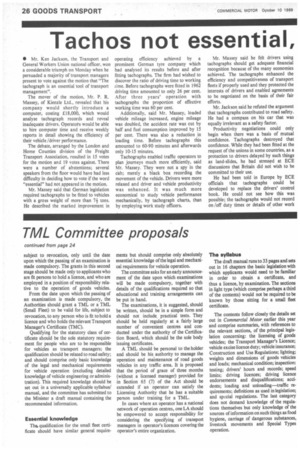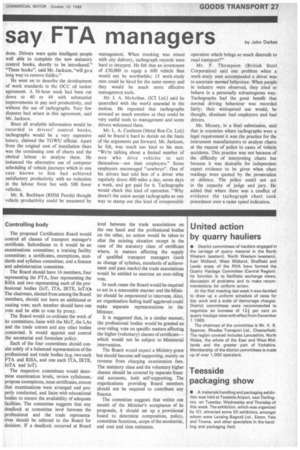Tachos not essential,
Page 28

Page 29

If you've noticed an error in this article please click here to report it so we can fix it.
say FTA managers by John Darkes • Mr. Ken Jackson. the Transport and General Workers Union national officer, won a considerable triumph on Monday when he persuaded a majority of transport managers present to vote against the motion that -The tachograph is an essential tool of transport management".
The mover of the motion. Mr. P. R. Massey, of Kienzle Ltd., revealed that his company would shortly introduce a computer, costing £18,000, which would analyse tachograph records and reveal inadequate drivers. Operators would be able to hire computer time and receive weekly reports in detail showing the efficiency of their vehicle /driver performance.
The debate, arranged by the London and Home Counties division of the Freight Transport Association, resulted in 15 votes for the motion and 19 votes against. There were a number of abstentions; several speakers from the floor would have had less difficulty in deciding how to vote if the word "essential" had not appeared in the motion.
Mr. Massey said that German legislation required tachographs to be fitted to vehicles with a gross weight of more than 74 tons. He described the marked improvement in
operating efficiency achieved by a prominent German tyre company which had analysed its results before and after fitting tachographs. The firm had wished to discover the ratio of driving time to working time. Before tachographs were fitted in 1962 driving time amounted to only 26 per cent. After three years' operation with tachographs the proportion of effective working time was 60 per cent.
Additionally, said Mr. Massey, loaded vehicle mileage increased, engine mileage was doubled, the accident rate was cut by half and fuel consumption improved by 15 per cent. There was also a reduction in loading time. Before tachographs this amounted to 60-90 minutes and afterwards only 10-15 minutes.
Tachographs enabled traffic operators to plan journeys much more efficiently, said Mr. Massey. They were not a spy in the cab; merely a black box recording the movement of the vehicle. Drivers were more relaxed and driver and vehicle productivity was enhanced. It was much more economical to study vehicle performance mechanically, by tachograph charts, than by employing work study officers. Mr. Massey said he felt drivers using tachographs should get adequate financial recognition because of the many economies achieved. The tachographs enhanced the efficiency and competitiveness of transport fleets if properly used and they protected the interests of drivers and enabled agreements to be negotiated on the basis of their fair efforts.
Mr. Jackson said he refuted the argument that tachographs contributed to road safety. He had a compass on his car that was equally irrelevant as a safety factor.
Productivity negotiations could only begin when there was a basis of mutual confidence. Tachographs destroyed that confidence. While they had been fitted at the request of the unions in some countries, as a protection to drivers delayed by such things as land-slides, he had stressed at ECE discussions that Britain did not wish to be committed to their use.
He had been told in Europe by ECE officials that tachographs could be developed to replace the drivers' control book. He could not see how this was possible; the tachographs would not record an /off duty times or details of other work done. Drivers were quite intelligent people well able to complete the new statutory control books, shortly to be introduced." "These books", said Mr. Jackson, "will go a long way to remove fiddles."
He went on to describe the development of work standards in the OCC oil tanker agreement. A 56-hour week had been cut down to 40 or 44 with substantial improvements in pay and productivity, and without the use of tachographs. Very few disputes had arisen in this agreement, said Mr. Jackson.
Since all available information would be recorded in drivers' control books, tachographs would be a very expensive luxury, claimed the TGWU official. Apart from the original cost of installation there was the continuing cost of charts and the clerical labour to analyse them. He instanced the alternative use of computer scheduling of vehicle journeys which in one case known to him had achieved satisfactory productivity with no reduction in the labour force but with 500 fewer vehicles.
Mr. R. Beckham (RHM Foods) thought vehicle productivity could be measured by management. When trunking was mixed with city delivery, tachograph records were hard to interpret. He felt that an investment of £30,000 to equip a 600 vehicle fleet would not be worthwhile; 15 work-study men could be hired for the same money and they would be much more effective management tools.
Mr. I. A. McArthur, (ICI Ltd.) said he quarrelled with the world essential in the motion. He regretted that tachographs aroused so much emotion as they could be very useful tools to management and some drivers welcomed them.
Mr. L. A. Castleton (Metal Box Co. Ltd.) said he found it hard to decide on the basis of the arguments put forward. Mr. Jackson, he felt, was much too kind to his men. "We're talking about a limited number of men who drive vehicles to suit themselves—not their employers." Some employers encouraged "cowboys". One of his drivers had told him of a driver who regularly drove 400 miles a day, seven days a week, and got paid for it. Tachographs would check this kind of operation. "Why doesn't the union accept tachographs as one way to stamp out this kind of irresponsible operation which brings so much discredit to road transport?"
Mr. P. Thompson (British Steel Corporation) said one problem when a work-study man accompanied a driver was to ascertain normal behaviour. When people in industry were observed, they tried to behave in a personally advantageous way. Tachographs had the great benefit that normal driving behaviour was recorded fairly; their widespread use would, he thought, eliminate bad employers and bad drivers.
Mr. Massey, in a final submission, said that in countries where tachographs were a legal requirement it was the practice for the instrument manufacturers to analyse charts at the request of police in cases of vehicle accidents. This practice was not because of the difficulty of interpreting charts but because it was desirable for independent expert evidence to be given when chart readings were quoted by the. prosecution or defence. The police could not act in the capacity of judge and jury. He added that where there was a conflict of evidence the tachograph chart took precedence over a radar speed indication.
























































































































